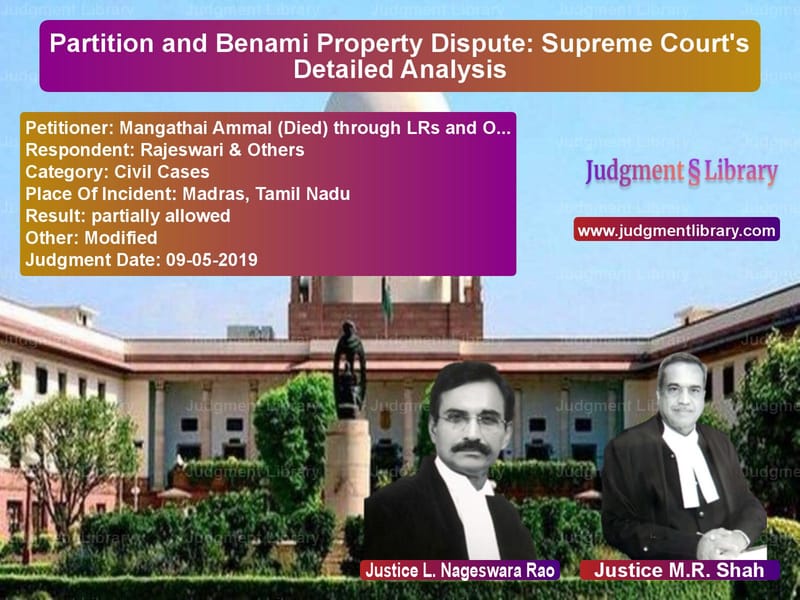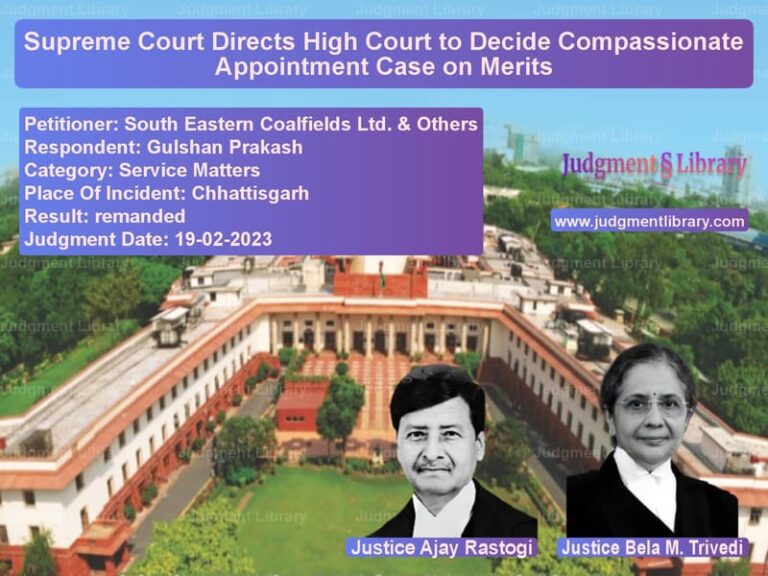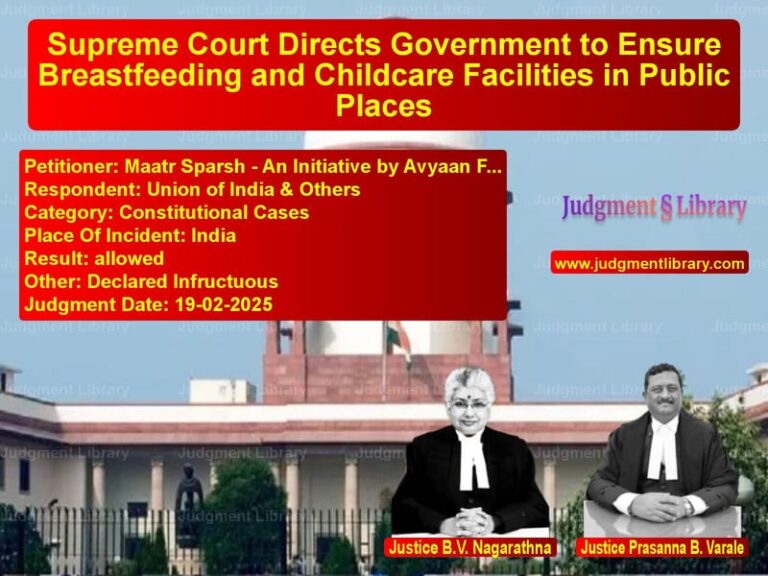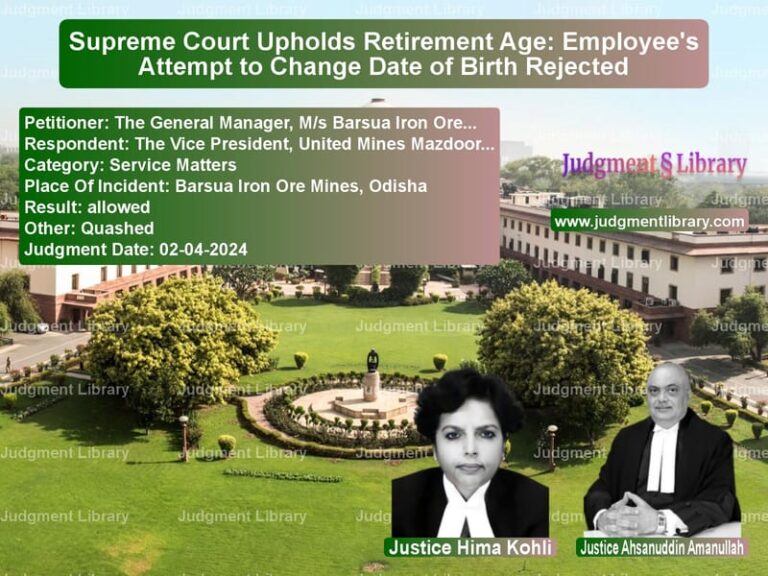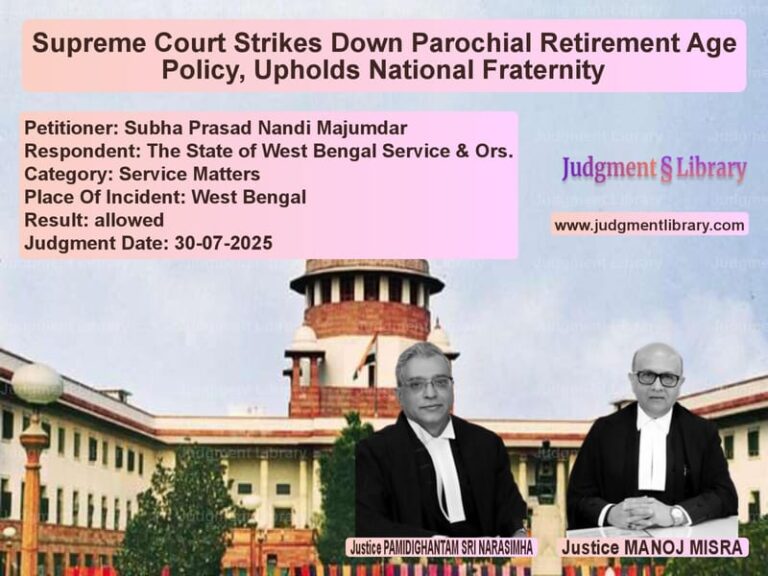Partition and Benami Property Dispute: Supreme Court’s Detailed Analysis
The Supreme Court judgment in Mangathai Ammal (Died) through LRs and Others vs. Rajeswari & Others is a landmark case that delves into intricate issues surrounding property partition, benami transactions, and ancestral property rights. This case primarily revolved around the claim that certain properties were joint family properties, while the defendant argued that they were self-acquired properties of an individual. The ruling provides clarity on the burden of proof in benami transactions and reinforces legal principles governing ancestral and self-acquired properties.
Background of the Case
The dispute arose when the plaintiffs, led by Rajeswari, filed a suit for partition, claiming a share in properties registered in the name of Mangathai Ammal. They contended that these properties were purchased using funds from ancestral properties and were thus joint family properties. The first defendant, Mangathai Ammal, denied these claims, asserting that she had independently acquired the properties using her stridhana (personal wealth) and personal income.
The trial court ruled in favor of the plaintiffs, holding that the properties were joint family assets, making them liable for partition. The High Court upheld this view. Dissatisfied with this decision, the defendants filed an appeal in the Supreme Court, challenging the categorization of the properties and the High Court’s interpretation of the burden of proof in benami transactions.
Key Legal Issues Considered
- Whether the suit properties were ancestral properties or self-acquired properties of the first defendant.
- Whether the transactions in favor of the first defendant were benami in nature.
- Who bore the burden of proof in establishing whether the properties were benami transactions?
- Whether the plaintiffs were entitled to a share in the suit properties.
Arguments Presented
Petitioners (Mangathai Ammal and Others)
- The burden to prove a benami transaction rests on the plaintiffs, and they failed to establish their claim with credible evidence.
- The properties were purchased solely by Mangathai Ammal through her own personal wealth, which included her stridhana and savings.
- Just because the property was purchased in a woman’s name does not automatically mean it belongs to the joint family.
- No direct evidence was presented to prove that funds from ancestral property sales were used for these purchases.
- The claim of the plaintiffs was based on assumptions rather than documentary evidence.
Respondents (Rajeswari and Others)
- The properties were purchased using proceeds from ancestral property sales, making them joint family properties.
- The first defendant (Mangathai Ammal) acknowledged the joint family ownership by executing a release deed.
- The plaintiffs had lived on and exercised control over the suit properties for years, further proving that they were part of the joint family estate.
- The properties were always treated as joint family properties by all members, including the first defendant.
Supreme Court’s Observations
1. Burden of Proof in Benami Transactions
The Supreme Court emphasized that proving a transaction as benami requires strict and substantial evidence. It held that the burden of proof lay with the plaintiffs, and they failed to provide sufficient evidence to establish that the properties were acquired using joint family funds.
The Court stated:
“A person who claims a property to be benami must prove that the consideration for the purchase was provided by someone other than the registered owner.”
2. Property Purchased in Wife’s Name
The Court ruled that simply purchasing a property in the name of a wife does not make it a joint family property. It reiterated that:
“The presumption is that a property registered in an individual’s name belongs to them unless strong evidence proves otherwise.”
3. Execution of a Release Deed
The respondents argued that a release deed executed by the first defendant showed her acknowledgment of joint family ownership. However, the Court found that the release deed was conditional and did not conclusively establish joint family ownership.
4. No Direct Evidence of Ancestral Funds
The Supreme Court found that:
- No financial records or direct proof linked the purchase of the suit properties to the proceeds of ancestral property sales.
- The first defendant provided evidence of her income sources and stridhana, which was used to purchase the properties.
- The absence of bank transactions or financial documents supporting the plaintiffs’ claim further weakened their case.
Final Judgment
The Supreme Court ruled:
- The properties were self-acquired by Mangathai Ammal and were not joint family properties.
- Except for two properties that were proven to be joint family properties, all other properties were to remain with the first defendant.
- The High Court and Trial Court erred in shifting the burden of proof onto the defendants.
Thus, the Court modified the decree and dismissed the respondents’ claim to a 3/4th share in the entire property.
Implications of the Judgment
- It reinforces that benami allegations require strict proof and cannot be based on mere assumptions.
- Properties purchased in a wife’s name do not automatically belong to the joint family unless strong evidence supports such claims.
- Stridhana and personal income must be acknowledged when determining ownership of a property.
- The ruling strengthens protections for women’s property rights under Hindu Succession Law.
- The decision provides clarity on partition disputes and the role of legal heirs in claiming ancestral properties.
Conclusion
This Supreme Court ruling is a crucial precedent in cases involving family property disputes, benami transactions, and partition claims. It reaffirms that ownership should be determined based on legally admissible evidence rather than presumptions. By ruling in favor of the appellant, the Court has emphasized the importance of upholding documentary evidence and protecting the rights of individuals against unsubstantiated claims.
Petitioner Name: Mangathai Ammal (Died) through LRs and Others.Respondent Name: Rajeswari & Others.Judgment By: Justice L. Nageswara Rao, Justice M.R. Shah.Place Of Incident: Madras, Tamil Nadu.Judgment Date: 09-05-2019.
Don’t miss out on the full details! Download the complete judgment in PDF format below and gain valuable insights instantly!
Download Judgment: Mangathai Ammal (Die vs Rajeswari & Others Supreme Court of India Judgment Dated 09-05-2019.pdf
Direct Downlaod Judgment: Direct downlaod this Judgment
See all petitions in Property Disputes
See all petitions in Succession and Wills
See all petitions in Landlord-Tenant Disputes
See all petitions in Damages and Compensation
See all petitions in Judgment by L. Nageswara Rao
See all petitions in Judgment by Mukeshkumar Rasikbhai Shah
See all petitions in partially allowed
See all petitions in Modified
See all petitions in supreme court of India judgments May 2019
See all petitions in 2019 judgments
See all posts in Civil Cases Category
See all allowed petitions in Civil Cases Category
See all Dismissed petitions in Civil Cases Category
See all partially allowed petitions in Civil Cases Category

